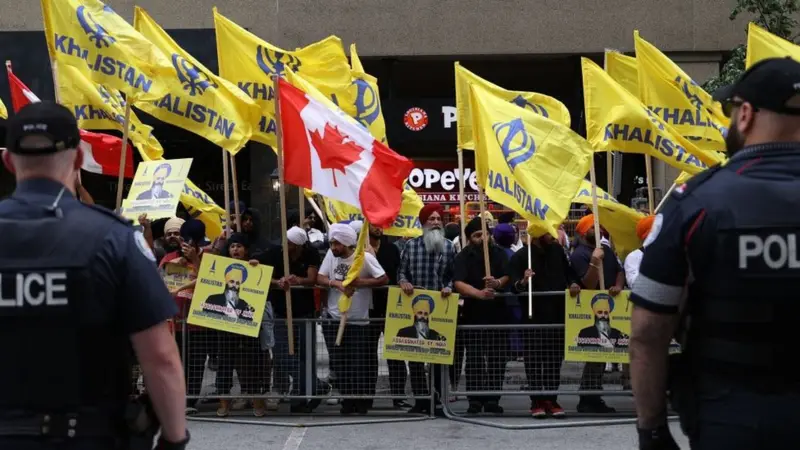Khalistan Movement: A Strain on India-Canada Relations

The escalating row over the Khalistan movement has become a significant source of tension between India and Canada. This issue, rooted in demands for an independent Sikh homeland, has placed pressure on diplomatic relations and stirred political and social unrest in both nations. While the movement has its historical roots in the Punjab region of India, it has found vocal support among Sikh communities in countries such as Canada, where a large Sikh diaspora resides.
Historical Background
The demand for Khalistan, an independent Sikh state, traces back to the 1980s, following increased dissatisfaction among some Sikh groups regarding their political representation and religious rights in India. The movement’s climax was Operation Blue Star in 1984, when the Indian government led a military assault on the Golden Temple in Amritsar, a major religious and political center for Sikhs. This operation deeply affected the global Sikh community and led to a surge in activism, some of which spread to other countries, including Canada.
Canada as a Center for Khalistani Activism
Canada is home to one of the largest Sikh populations outside of India, and it has been a significant platform for pro-Khalistan sentiment. Various groups in Canada have organized protests, rallies, and referendums advocating for Khalistan, often creating friction with the Indian government. While the Canadian government has maintained its stance against supporting any separatist movement on foreign soil, the freedom of expression and peaceful assembly allowed under Canadian law has enabled Khalistani activists to voice their demands more prominently.
The Indian government has consistently criticized the Canadian authorities for allegedly turning a blind eye to pro-Khalistan activities, accusing them of harboring extremists. This tension peaked when Indian authorities flagged concerns over certain Canadian political figures’ sympathetic approach toward the Khalistan movement.
Political Fallout
The Khalistan row has had visible consequences on India-Canada diplomatic ties. India has expressed concerns over what it perceives as Canadian tolerance of anti-India activities, while Canada has emphasized the need to uphold democratic rights for all communities. The tension recently heightened following high-profile exchanges between officials of both countries regarding Khalistan-related incidents.
For instance, the assassination of Sikh leader Hardeep Singh Nijjar in Canada, who was linked to pro-Khalistan activism, led to accusations that Indian agencies were involved. This incident sparked diplomatic spats and demands for investigations, with both countries standing firm in their positions.
Economic and Social Impacts
This diplomatic discord has the potential to impact economic relations between the two nations. Trade ties between India and Canada have been robust, but these strained political relations could hinder future partnerships. Moreover, the ongoing tensions have caused ripples within the Sikh diaspora in Canada, with some communities facing backlash or scrutiny due to their perceived political affiliations.
Canada’s position as a hub for Sikh migrants also adds a layer of complexity, as the country navigates balancing free expression with its international obligations to maintain friendly relations with India. Simultaneously, India continues to assert its sovereignty, opposing any movement that threatens its territorial integrity.
Outlook
The Khalistan issue remains a deeply sensitive subject, and its implications are likely to continue influencing India-Canada relations. While both governments have expressed the need to engage in diplomatic dialogue, the underlying tensions surrounding the Khalistan movement remain unresolved. As long as pro-Khalistan groups maintain a visible presence in Canada, and India continues to view these activities as a threat to its unity, the relationship between these two nations will likely face further strain.
In conclusion, while the Khalistan movement may have its origins in Indian soil, its ramifications have extended beyond borders, impacting foreign relations. Both countries now face the delicate challenge of addressing the concerns of their citizens and diaspora communities while maintaining diplomatic ties.
